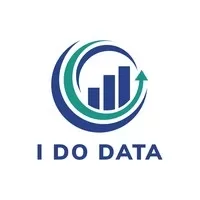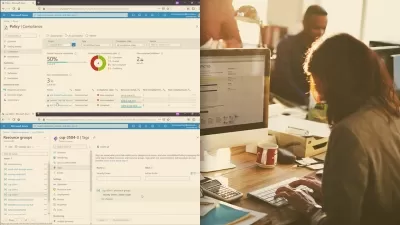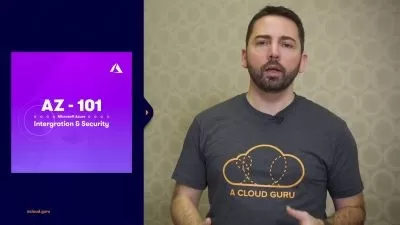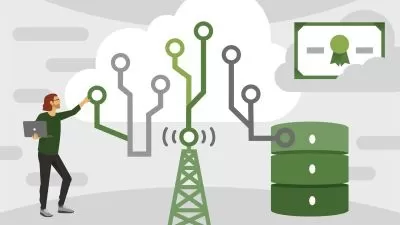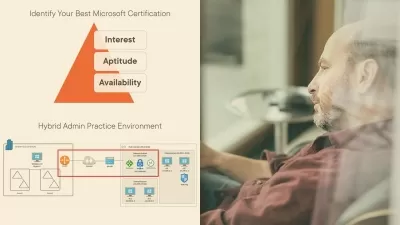DP-900: Microsoft Azure Data Fundamentals (Aug 2022 version)
Phillip Burton,I Do Data Limited
7:28:42
Description
Work with Azure data in the cloud, inc. relational (Azure SQL) and non-relational (Cosmos DB) databases. For exam DP-900
What You'll Learn?
- Understand types of core data workloads and data analytics core concepts
- Understand how to work with relational data on Azure, including Azure SQL Database and Managed Instance
- Understand how to work with non-relational data on Azure, including Cosmos DB APIs, Table, Blob and File storage
- Describe analytics workloads, including data warehouses, data ingestion and processing on Azure
- Describe data visualization in Microsoft Power BI, including reports and dashboards
Who is this for?
More details
DescriptionThis course is the foundation for the Microsoft Certificate DP-900 "Azure Data Fundamentals", and focuses on relational and non-relational data, together with analytics workloads. It is updated in line with the exam updates as of August 4, 2022.
What do people like you say about this course?
Girma says: "Great! – Azure would never be difficult (as most of us think) after thoroughly going through this course."
Ankona says:Â "Very good course. Philip proves why is indeed the go to guy for everything to do with databases. I have taken a couple of his courses on various aspects of databases and he never disappoints."
Karen says:Â "This course helped me to clear the exam with 903."
We'll start off with looking at relational data. We'll create an Azure account, install an Azure SQLÂ Database and query it. We'll then look at the 6 different clauses of the SELECT statement - SELECT, FROM, WHERE, GROUP BY, HAVING and ORDER BY. After this, we'll have a look at other relational databases, including Azure Databases for PostgreSQL, MariaDB and MySQL.
After that, we'll look at non-relational data using semi-structured and non-structured data. We'll look at the five different Cosmos DB database interfaces or APIs, and which one you should use for your particular needs. We'll also look at Table, Blob and File storage.
We'll then look at analytics workloads, including Azure data services for modern data warehouses such as Azure Data Lake, Synapse Analytics, Databricks and HDInsight.
Finally, we'll look at Microsoft Power BI and how to create basic reports and dashboards.
No prior knowledge is required - we'll even see how to get a free Azure trial!
There are regular quizzes to help you remember the information, so you can be sure that you are learning.
Once you have finished this course, you will have a good introductory knowledge of core data concepts and how they are implemented using Microsoft Azure data services. And with some practice, you could even go for an official Microsoft certification - wouldn't that look good on your CVÂ or resume? And if you are an American college student, you might even get college credit for passing that exam.
Who this course is for:
- This course is for you if you use data, and want to understand what is available on Azure.
- By the end of this course, after entering the official Practice Tests, you could enter (and hopefully pass) Microsoft's official DP-900 exam.
- Wouldn't the "Microsoft Certified: Azure Data Fundamentals" certification look good on your CV or resume?
This course is the foundation for the Microsoft Certificate DP-900 "Azure Data Fundamentals", and focuses on relational and non-relational data, together with analytics workloads. It is updated in line with the exam updates as of August 4, 2022.
What do people like you say about this course?
Girma says: "Great! – Azure would never be difficult (as most of us think) after thoroughly going through this course."
Ankona says:Â "Very good course. Philip proves why is indeed the go to guy for everything to do with databases. I have taken a couple of his courses on various aspects of databases and he never disappoints."
Karen says:Â "This course helped me to clear the exam with 903."
We'll start off with looking at relational data. We'll create an Azure account, install an Azure SQLÂ Database and query it. We'll then look at the 6 different clauses of the SELECT statement - SELECT, FROM, WHERE, GROUP BY, HAVING and ORDER BY. After this, we'll have a look at other relational databases, including Azure Databases for PostgreSQL, MariaDB and MySQL.
After that, we'll look at non-relational data using semi-structured and non-structured data. We'll look at the five different Cosmos DB database interfaces or APIs, and which one you should use for your particular needs. We'll also look at Table, Blob and File storage.
We'll then look at analytics workloads, including Azure data services for modern data warehouses such as Azure Data Lake, Synapse Analytics, Databricks and HDInsight.
Finally, we'll look at Microsoft Power BI and how to create basic reports and dashboards.
No prior knowledge is required - we'll even see how to get a free Azure trial!
There are regular quizzes to help you remember the information, so you can be sure that you are learning.
Once you have finished this course, you will have a good introductory knowledge of core data concepts and how they are implemented using Microsoft Azure data services. And with some practice, you could even go for an official Microsoft certification - wouldn't that look good on your CVÂ or resume? And if you are an American college student, you might even get college credit for passing that exam.
Who this course is for:
- This course is for you if you use data, and want to understand what is available on Azure.
- By the end of this course, after entering the official Practice Tests, you could enter (and hopefully pass) Microsoft's official DP-900 exam.
- Wouldn't the "Microsoft Certified: Azure Data Fundamentals" certification look good on your CV or resume?
User Reviews
Rating
Phillip Burton
Instructor's CoursesI Do Data Limited
Instructor's Courses
Udemy
View courses Udemy- language english
- Training sessions 80
- duration 7:28:42
- English subtitles has
- Release Date 2023/02/26






